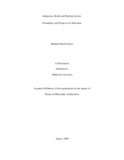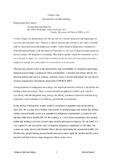Please use this identifier to cite or link to this item:
https://elibrary.tucl.edu.np/handle/123456789/1638| Title: | Indigenous Health and Healing System: Potentiality and Prospects for Education |
| Authors: | Siwakoti, Hemanta Raj |
| Keywords: | Therapy;Healing;Indigenous health;Health education;Psychology |
| Issue Date: | Aug-2009 |
| Publisher: | Master of Philosophy in Education |
| Abstract: | With this cross-cultural qualitative indigenous study, I sought to understand the constituents of Tamang health and healing system and their potentialities intending to draw health and educational implication from it. For this, my primary research question was ‘What were the constituents and potentialities of Tamang health and healing system?’ To ease my study, I formulated three subsidiary questions focusing on constituents, potentialities and their implication to health and education system. The review of literature made on four areas, namely, identity of indigeniety in Nepal; Tamang as indigenous people; disease, illness and treatment systems and global indigenous health and healing literature, revealed that Tamang health system was studied with focus on their shamanic healing and also that there were globally diverse and interesting indigenous health and healing systems some of which were trying to be developed as alternative health systems and modern technology was being injected on them. For my field study I purposively selected twenty Tamang research participants from Deurali in Nuwakot and Chapali Bhadrakali in Kathmandu. I was engaged in conversational interviews, sharing experiences, studying history and tradition, observing performances, observing ecology and locale of the villages and residences. I cautiously adopted ethnography, phenomenology, archaeology, interpretive practice and social action to enhance my understanding of the field. I used, diary keeping, recorder and video camera for the collection of data. After my field, I employed frameworks of indigenized research with Kaupapa Maori theory, habitus, embodiedness and cultural capital, critical postmodernism and grounded approach for the analysis and interpretation of my study field. My study came up with a new perception of the meaning of health and healing. Health was associated with satisfaction and healing was sought in accordance with the habitus and cosmovision of the patient. If the system satisfied the patient, it was valid. Multiple components of their health and wellbeing constituted their health and healing syste, which I termed as ‘holistic approach’, in which cultural, social, religious, ecological, behavioural and structural components played dominant role . They were found more preventive than curative in which spiritual healing was only one component among many. The findings showed a number of potential health elements including psychotherapeutic and music therapy healing, adopting life in tune with nature, ecology and environment and the role of moral and cultural life for the wellbeing. Their healing systems showed scientific components and procedures applied pragmatically. The indigenous healers went through preventive, diagnostic and curative stages during treatment. The findings gave potential implication to restructure our health and education systems from indigenous and post modern perspectives and I offered implications to rectify injustice to indigenous people on one hand and to benefit from the rich and humanistic indigenous mine of knowledge in the cultivation of humankind on the other. Comparative study of global indigenous health literature could bring more ways of applying Tamang health and healing methods using science and research. What was needed was the deeper study of them and blending technology with them. I realized need of further research and exploration in this field by more researchers. From the perspective of implication to education, this study showed that Tamang health system, could contribute a lot. Our existing education system did not support indigenous students’ learning in our schools as school pedagogy was normative, alien and indifferent to local and indigenous knowledge. It was essential to introduce Tamang cultural capital in the mainstream school capital in their regions. I saw it essential to deconstruct and reconstruct the education system form indigenous perspective. At the same time, I felt the need of indigenous health institutions from basic to research level to promote indigenous health and healing system of Tamangs. In fact, I had a great insight on Tamang health and healing system and its importance on health and education systems. |
| URI: | http://elibrary.tucl.edu.np/handle/123456789/1638 |
| Appears in Collections: | English Language Education |
Files in This Item:
| File | Description | Size | Format | |
|---|---|---|---|---|
| cover page.pdf | 115.87 kB | Adobe PDF |  View/Open | |
| thesis.pdf | 1.21 MB | Adobe PDF |  View/Open |
Items in DSpace are protected by copyright, with all rights reserved, unless otherwise indicated.
